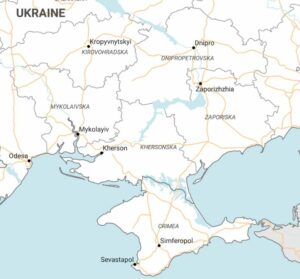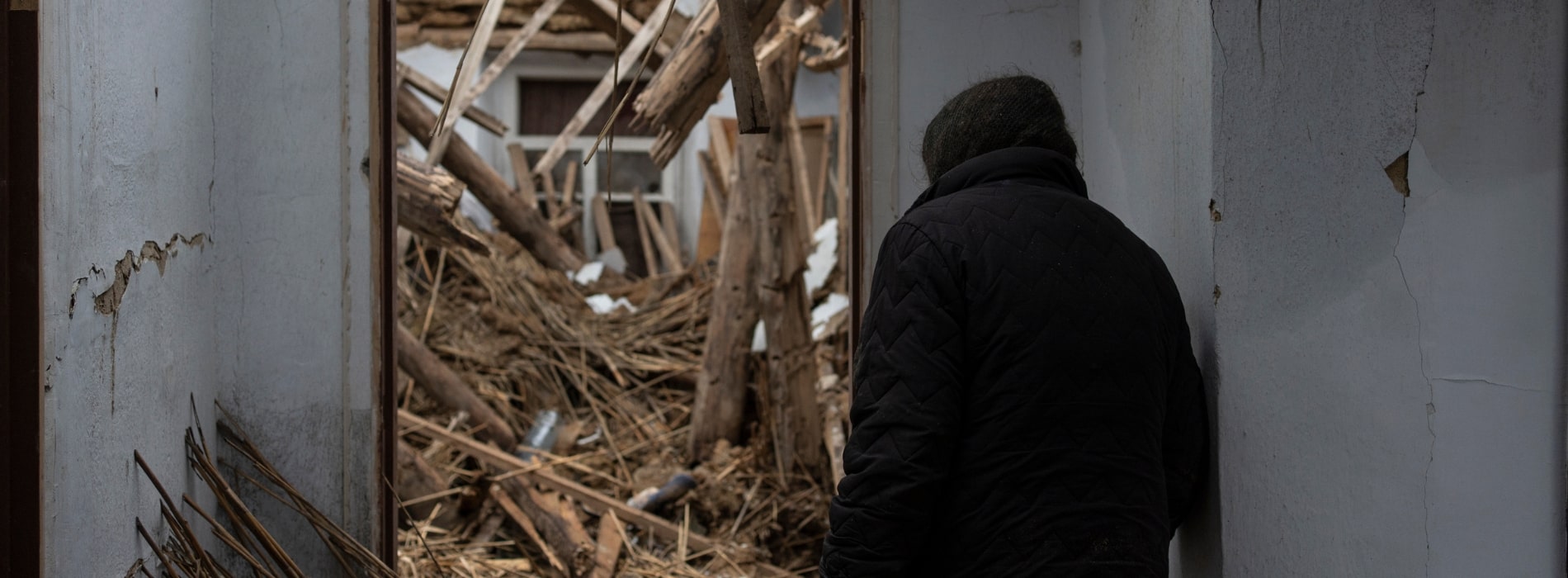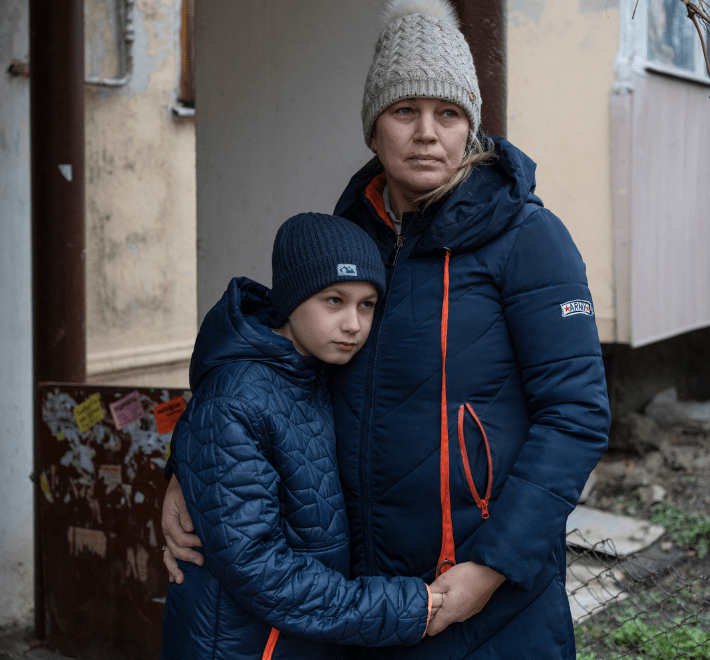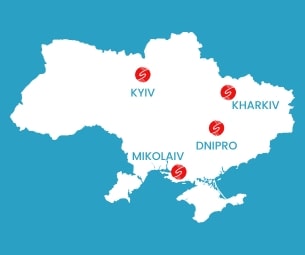Responding to the emergency after the bombing
Two hours east of Mykolayev, a road with little traffic leads to Lyubomyrivka, a village near the Kherson Oblast. Although the temperatures are rather mild that day, the season is wet and harsh, and the mud is everywhere. On the road, houses with torn off roofs and broken windows testify to the reality of a high intensity artillery war.

The morning is already well advanced and the villagers are gathered in front of the Maison de la Culture: a distribution of firewood is organized by SOLIDARITÉS INTERNATIONAL. The villagers are busily working around the distribution site: piles of wood are organized by households and villagers load trailers while colorful Lada cars and tractors come and go to transport the cargo.
Nadjia, 62 years old, supervises the distribution. She is the “Starosta”, the local authority in charge of three villages: Lyubomyrivka, Yakovlivka and Vyeseli Kut. Unlike Snihurivka, a strategic locality located about 15 kilometers away, the three villages have never been under Russian control.
However, they were severely affected by the hostilities between March and November 2022, due to their proximity to the front line, less than 10 km away. “There was no electricity. No stores were open. No water – the boreholes weren’t working,” Nadjia says.
Ukraine
Context and action- 37 million inhabitants
- 77th out of 191 countries on the Human Development Index
- 501,843 people rescued since march 2022
“Someone managed to buy a generator. Then other villagers visited him to charge their phones. This is not three months we’re talking about – it was eight months… That’s the kind of life we had until December 15, when we were reconnected to electricity. May and July were the most difficult months, with intense bombing. All the houses were more or less damaged”, she continues.
Dozens of houses destroyed
Valentina, with a scarf on her head and a reserved smile, refuses close-ups, but wants to tell her story and show us her house which was partially destroyed by the impact of a missile in August. Valentina and her husband were in a nearby basement. In one part of the house, the impact is so bad that two of the rooms are just a pile of rubble. Her husband tried to start working, but fell and injured his hip. The house remains uninhabitable in its current state.

For others, the damage was lighter and allowed them to return home. This is the case for Tania, 78 years old. The windows of her house were damaged by the bombing, forcing her to seek refuge with relatives in Bereznuhavete. She has just bought wooden panels that she intends to install quickly. Tania, probably because of her recent return, is not on the list of people who will benefit from the distribution of firewood, but she assures that the inhabitants will share their wood with her, while waiting for the next distribution. “I was born here, I spent my whole life here. For months I have been going back and forth between Lyubomyrivka and Bereznuhavete, but this time I am back for good,” she says.
Compromised agricultural activities
At the height of the hostilities, only 60 people out of 600 remained in Lyubomyrivka. Victor, Leonid and Volodymir are among those villagers who never left. “At my age, I can’t go somewhere to start all over again. And ‘’my health is not at its best’’ says Victor, 57. Their features hollowed out and their hands bruised from farm work, the three men chat around a stockpile of wood. All three are farmers. “What else do you do here, except work the land? Everyone lives off the land, there is no other work,” says Volodymir. He expresses some bitterness towards the meat producers who took advantage of the war and bought their cattle for pittance: “We sold our cows for almost nothing.”
Despite the distance from the front line, which is now at the level of the Dnieper, a few dozen kilometers away, agricultural activities are compromised, as the land has become inoperable due to the presence of mines and unexploded ordnance. “We go to the fields at our own risk. We go by car and if we see something suspicious on the road, we drive around it and continue,” says Victor.
The challenge of the presence of mines and unexploded ordnance on the land is major, confirms Nadjia:
“The biggest difficulty for the villagers is that the land has not been cleared of mines at all. People cannot cultivate the soil. You have to sow and grow something the next year to have food.”
This situation deprives the inhabitants of sources of income and makes them dependent on humanitarian aid. Among the actors present in the Mykolaïv region, SOLIDARITÉS INTERNATIONAL has been operational in the region since the first months of the war:
“The humanitarian needs are enormous, whether in areas directly affected by bombing and hostilities or in newly accessible areas that have been hard hit by the war. SOLIDARITÉS INTERNATIONAL continues to respond to the needs in terms of access to drinking water, both in Mykolaïv, since May 2022, and more recently in the newly accessible areas of Kherson. In these villages, which were close to the front line, the situation remains difficult and, with the winter, the humanitarian needs are even greater. The return of the population is still limited, but some people are starting to return and rebuild their houses. The NGO is distributing firewood and emergency shelter kits to meet the most immediate needs of the population,” explains Anne-Sophie Morel, SOLIDARITÉS INTERNATIONAL’s field coordinator for the regions of Odesa, Mykolaïv and Kherson.
Today, despite some returns, Lyubomyrivka has only 176 inhabitants, out of an initial population of 600. The rest of the population is among the 5,914,000 internally displaced persons in Ukraine, according to figures provided by the International Organization for Migration (IOM) on 5 December 2022. The regions of Mykolayev and Odesa each host between 110,000 and 140,000 IDPs, generating significant humanitarian needs.
Coping with the precariousness of displaced persons
At the SOLIDARITÉS INTERNATIONAL warehouse in Odesa, a team prepares hygiene kits, while other team members place stickers in the colors of the NGO and the European Union on 75 food packages that will then be loaded and distributed to displaced people that afternoon. In 2022, funding from the European Commission (ECHO) provided material assistance (hygiene kits, food packages and other nonfood items) to nearly 4,000 displaced and vulnerable people in the Odesa Oblast.
At the distribution site, a group of displaced people patiently wait to register before receiving a food package. Among them, many people recently arrived from Kherson. Following the recapture of Kherson by the Ukrainians on November 11, 2022, the city was subjected to intense shelling and artillery fire that continues to this day, forcing part of the population to evacuate the area.
This is the case of Tetiana, who welcomes us in her apartment in Odesa, a small two-room apartment with a flowery decor. She arrived from Kherson with her son on December 3, 2022. Between the humanitarian aid she receives and the support of her family, she manages to meet the most urgent needs. She hopes to find work, but worries about leaving her 10-year-old son home alone: “I would definitely find work, maybe it won’t pay much, but I don’t want to be too far away. If there’s an alert or a blackout, I’d be worried sick,” she says. “It’s very hard psychologically. You’re here, but your whole life has been there.”

Lioubov, 72 years old, has also recently arrived from Kherson. In the small apartment she rents on the outskirts of Odesa, she recalls with nostalgia her life in Kherson, and her flowery dacha on an island in the Dnieper, now under Russian control. “Life was beautiful,” she repeats. The intensification of the bombing in the Ostriv district of Kherson, where she lived with her husband, prompted her to leave Kherson, with their cat Mars. Her husband, Vladimir, 80 years old, has just joined her. Their daughter, who lives in Spain, is helping them, as her pension of 3000 UAH (about 74€) does not even allow her to pay for her apartment, the rent of which amounts to 6000 UAH (about 148€). For her too, the humanitarian aid of SOLIDARITÉS INTERNATIONAL is necessary.
Financial assistance to survive the winter
In addition to food and hygiene assistance, winter generates specific needs. A data collection organized by SOLIDARITÉS INTERNATIONAL in December 2022 showed that the main needs at this time of the year were for heating means, particularly wood and fuel (50% of responses), warm clothes and shoes (48% of responses), medicines (32% of responses) and food (29%).
“The majority of IDPs in the Odesa Oblast arrived in the first three months of the war. They had high hopes of returning home as soon as possible, so it was very difficult for them to plan for the coming season and anticipate their needs, especially for the winter season. As a result, vulnerabilities increased sharply as winter approached, deteriorating the living conditions of the displaced people,” explains Maeva Hegoburu, Basic Needs Project Officer for SOLIDARITÉS INTERNATIONAL in the Odesa Oblast.
“Faced with winter, the needs are multiple and diverse depending on the situation of each family. The security instability and difficulties in accessing the market within the Oblast are such that monetary assistance is preferred in towns, allowing those affected to freely meet their priority needs to overcome the winter,” she adds.
The first step before receiving monetary assistance is to identify potential beneficiaries and their needs. A SOLIDARITÉS INTERNATIONAL team is responsible for calling these displaced and vulnerable people, based on lists provided by the local authorities. Using a questionnaire, they identify the needs of the people concerned. The discussion often overflows: “There are many difficult stories, many people in very difficult situations. We ask them about their needs and they tell us everything, if they have lost a loved one, if they have been through difficult situations. We listen to them, even if sometimes it doesn’t answer our questions”, says Oleksandr Kotolevych, one of the employees, himself displaced from Donetsk. Out of 100 calls made in one day, sometimes only 20 will be answered: “with the power cuts, people don’t always have a network, and become unreachable,” explains Vladislav Perepeliuk, another SOLIDARITÉS INTERNATIONAL employee, also displaced, recently arrived from Kherson with his family. This situation further isolates people and increases their vulnerability.
This winter, the cash assistance provided by SOLIDARITÉS INTERNATIONAL in the Odesa Oblast will target 1,200 people. With temperatures turning negative, the onset of snow and regular strikes on energy infrastructure, the response to the humanitarian needs of people in the Odesa Oblast has become more difficult.
© Myriam Renaud

